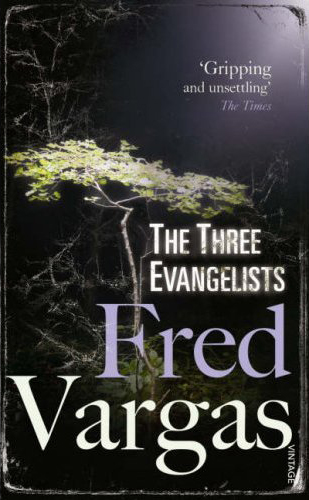
EURO CRIME
Reviews

Vargas, Fred - 'The Three Evangelists' (translated by Sian Reynolds)
Paperback: 304 pages (Jan. 2007) Publisher: Vintage ISBN: 0099469553
Sophia, a retired opera singer, is disturbed to find that a beech tree has been planted in her garden overnight. Her husband, Pierre, is uninterested, so she enlists the help of three semi-unemployed academics who live in the dilapidated house next door to dig it up in case something has been buried under it. Nothing is found, and for the next 50 pages or so, the book is a charming account of this French neighbourhood and the people in it. Then Sophia vanishes and events take a more sinister turn, as the three friends try to find out what has happened.
The academics (Marc, Mathias and Lucien, hence the title of the book) are wittily captured: I particularly liked their living arrangements whereby each one lives on the floor appropriate to his historical period of study, creating a strata of hunter-gatherer (Mathias, bottom), medieval (Marc) and first world war (Lucien). Above Lucien lives Marc's disgraced uncle, a retired policeman and moral reprobate, who, as the book progresses, forms the link between the parallel amateur and police investigations of the disappearance.
This author really seems to understand the academic mind, cleverly conveying the obsessive personalities of her three young men, with plenty of nice touches concerning their attitudes and relationships with the "real" world. After finishing the book, I was not surprised to read in the biographical note that Vargas is a historian and archaeologist by profession, as she's most sure as a writer when on these topics.
The main plot, though - the question of what happened to Sophia - seems aimless. The various suspects and other characters who crop up seem two-dimensional. Sophia's husband, who ought to be the main suspect on paper, is always away and, when he does appear, is wooden. The ironic tone makes the book more reminiscent of Christie, and far less similar to other European crime-fiction authors I have recently read for the first time: Carofiglio, Indridason, Nesbo or Nesser, all of whom are bleaker, darker writers, interested in human psyschology.
The book picks up in the last 30 pages or so, as several false solutions are exposed as such and the pace accelerates. The final answer does almost entirely hang together logically and does not quite cheat (for a moment I thought the author had decided to do what Janet Evanovich does, and make the criminal a character who had appeared at the start and then vanished so that the reader had forgotten all about him, but this turned out to be a red herring), although the solution is more akin to completing a jigsaw puzzle rather than bringing any general insight.
If you like your mysteries fairly light, and want an authentic, even charming, account of French life and attitudes, this is the book for you. If you prefer your crime noir, try elsewhere.
Read another review of THE THREE EVANGELISTS.
Maxine Clarke, England
February 2007
Details of the author's other books with links to reviews can be found on the Books page.
More European crime fiction reviews can be found on the Reviews page.